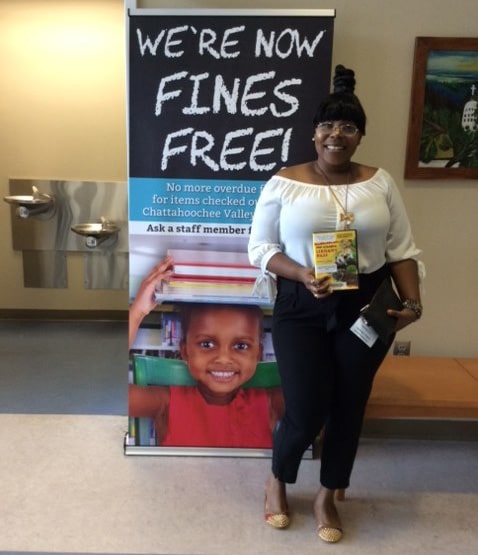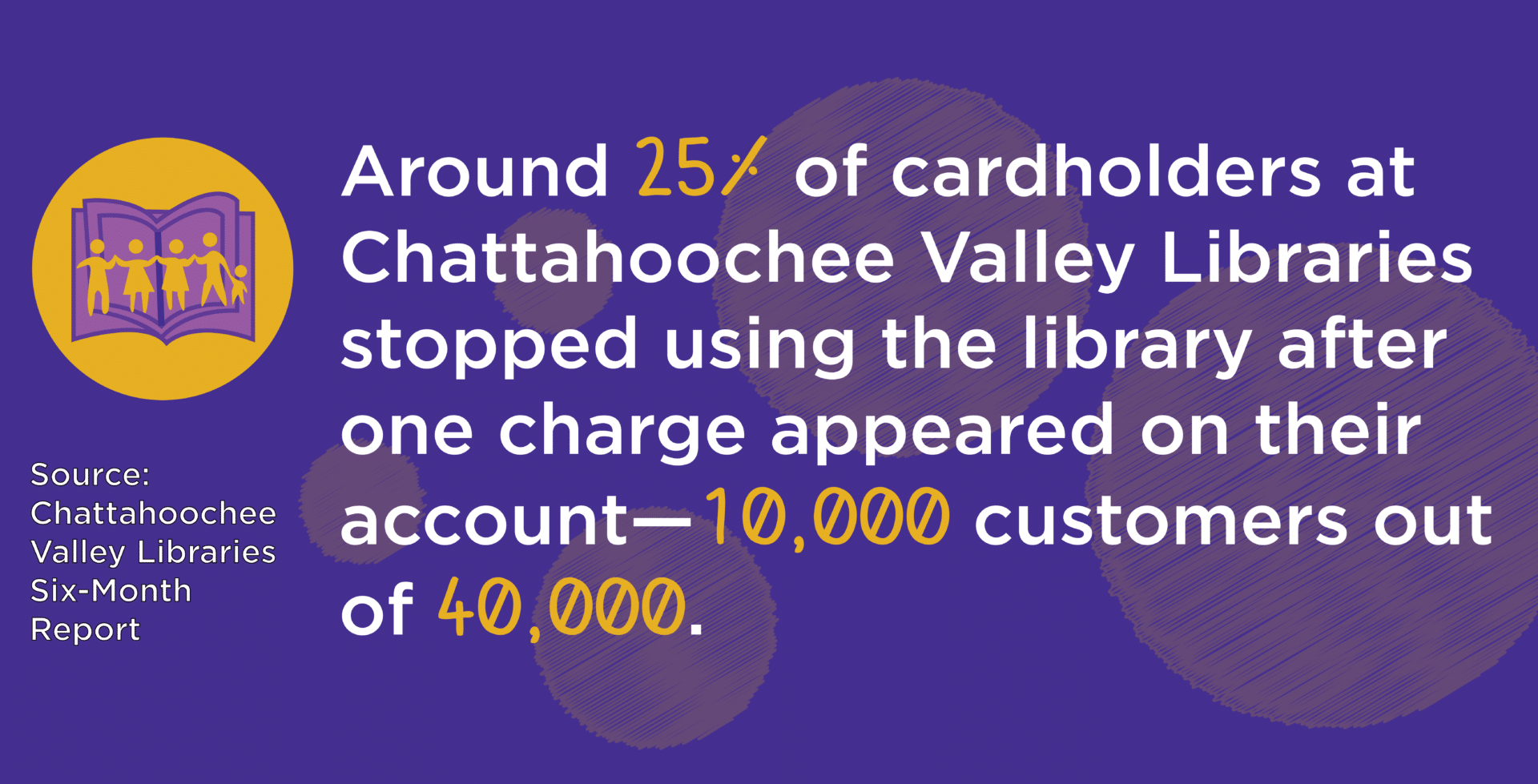Going Fine-Free in Georgia’s Libraries Leads to Noteworthy Gains

Libraries offer early literacy materials and programming for preschoolers, partner with school systems to reach students, help adults learn new skills to access better jobs, and offer opportunities to engage communities in lifelong learning. Yet, policies such as fines for late returns discourage patrons from checking out books and other resources that can improve their lives.
By unlocking the Get Georgia Reading Campaign for Grade-Level Reading’s “Six Keys to Access” (awareness, affordability, accessibility, availability, accommodating, and acceptability), libraries are creating conditions that are essential for children and families to succeed throughout school and life.
In 2019, Chattahoochee Valley Libraries (CVL) became the first library system in Georgia to unlock the key of affordability by going fine free, removing the daily charges that accrue when books aren’t returned by the scheduled due date.
This shift represented a revenue loss of just 1% across the four-county region—but resulted in a 20% increase in new library card applications and 14% increase in circulation in February 2020. These gains were even more pronounced in the branches serving lower-income areas.
“Nobody gets those kinds of numbers,” said CVL Director Alan Harkness. “Like any other business, I want greater market share. I want everyone in our community to have a library card, so I was excited to see these jumps. But I’m most excited about the longer-term impact on our community’s children. I remind my staff all the time that we’re planting trees whose shade we may not be around to enjoy. Others will, though—and that’s what makes this work so important.”

With a goal to boost early childhood literacy, CVL staff recognized that late fees and other fines were impeding their efforts. Reflecting a growing national trend, Harkness developed a plan in early 2019 for transitioning away from late fines in Chattahoochee, Marion, Muscogee, and Stewart counties.
“We have to be good stewards of the funding we’re given,” Harkness said. “We still charge people for the cost of a book if they don’t return it at the same interval that we did before. That accountability is baked into this process. We just realized that late fees aren’t actually an effective means for getting people to bring books back.”
The percentage of library card holders blocked from checking out books due to late fees was significantly higher in rural communities that had higher levels of poverty and more minority residents.
“The data revealed that fees were having a disproportionate negative impact on children and economically disadvantaged residents who have fewer resources to pay them—and fewer resources to purchase books and other resources that libraries offer,” said Harkness.
In addition to removing late fees, the Chattahoochee Library System also stopped charging patrons for lost library cards and the staff time required to order replacement books. More than 7,000 records were cleared—and, as patrons returned to the libraries, many brought back items that had caused fees to accrue in the first place. “The significant increase in returns from the previous year suggests that fines were actually in the way of getting our stuff back,” Harkness explained.

Library leaders addressed another key to access—awareness—by placing advertisements in the local newspaper, sponsoring billboards, posting signs in all branches, and emailing card holders to advertise the policy change. In August 2019, visits increased by 35%. By September, it was 56%. Staff from the South Columbus Public Library or South Columbus branch said it was like a family reunion with so many people coming back together.
“One family shared that they stopped checking out items because paying late fees meant the mom couldn’t afford the bus fare to get to work,” said Grace Nagel, director of The Basics Chattahoochee Valley and CVL board member. “For working people who must make hard choices with limited resources, these fees were a barrier to community access.”
“Both the stories and the data confirm our belief that fines are in direct conflict with libraries’ commitment to be welcoming, equitable community resources,” added Julie Walker, Georgia Public Library Service (GPLS) state librarian and associate vice chancellor. “It’s our goal to enhance access to our materials and services—particularly for those who need them most. Eliminating overdue fines is a key way to break down barriers to service, regardless of a user’s background or economic status. Every member of our communities deserves access to libraries.”
Access is one of the Get Georgia Reading Campaign’s four pillars of the framework for action applied by state and local leaders to ensure all children in Georgia are on a path to reading proficiently by third grade. The “Six Keys to Access” provide a framework for state and local leaders to identify and address barriers that can prevent children from receiving necessary supports and services.
“These keys are a powerful way to think about ways we can help grow readers in Georgia,” said Wendy Cornelisen, GPLS assistant state librarian and Georgia Library Association president. “There’s a free public library in every county in our state, which helps families unlock access to a world of resources.”
The CVL system has a robust early childhood outreach department that partners with preschools, Head Start programs, and child care centers. Library staff encourage fathers in the county jail to read, talk, sing, and play with their children during family visits—which often leads to these fathers bringing their kids to the libraries after their release to read, check out books, and explore job opportunities.
The Coastal Plain Regional Library System—serving Ben Hill, Berrien, Cook, Irwin, Tift, and Turner counties—launched a fines-free pilot in 2020, and GPLS is working with Georgia Library PINES (Public Information Network for Electronic Services) to explore the possibility of transitioning to a fines-free model. PINES represents a network of 300 libraries in 52 systems in 146 counties, providing patrons with access to a shared collection of 10.6 million books and materials.
“Public libraries in Georgia are individually governed by local boards of trustees, so any decision regarding the elimination of fines must take place at that level,” Walker explained. “We understand the dilemma caused by losing fines revenue, and we continue to seek solutions that will allow libraries to reconsider policies while maintaining healthy budgets. Libraries across the nation that have eliminated fines have experienced increased circulation, enhanced good will, and the return of users who lost access to the library due to long-standing fines—many of whom are children and young adults. This is exactly what we wish for in all of our libraries.”
Harkness noted that late fees represent a larger percentage of revenues in some communities. While the fees were just 1% of the regional system’s revenue, the fees accounted for more than 10% of revenue for some rural counties in the system.
“This will require more of a sacrifice for some counties,” said Harkness. “But we make choices and set priorities all the time. Some library leaders have told me they can’t afford to do this. I say, ‘You can’t afford not to do this.’ You have to make it a priority and figure out how to make it work. The more rural your community is, the poorer it is—the more important it is to do this.”
Contact:
Krystin Dean
GaFCP Communications Specialist
706-897-4711
krystin@gafcp.org
